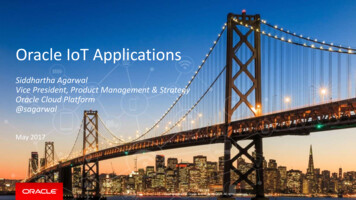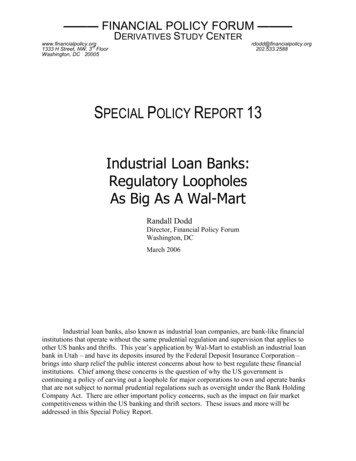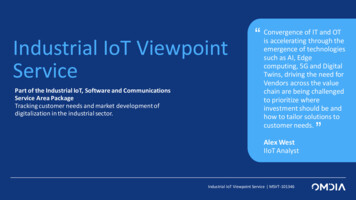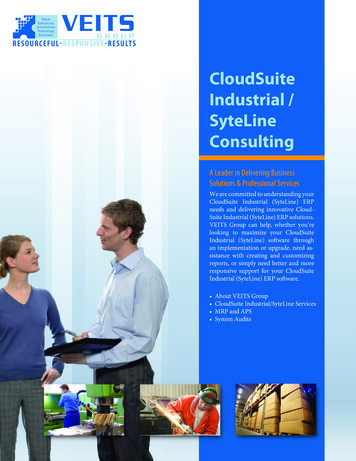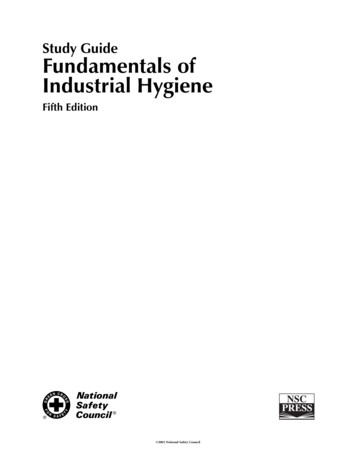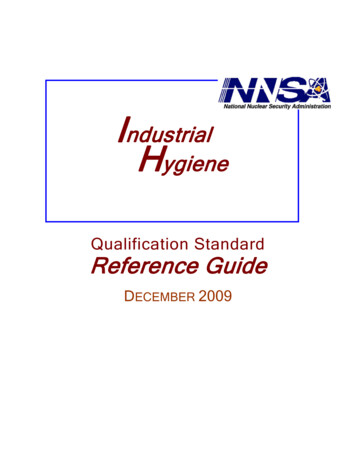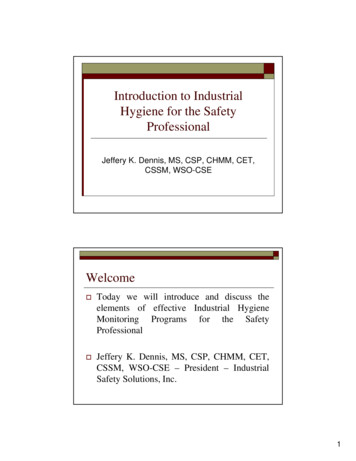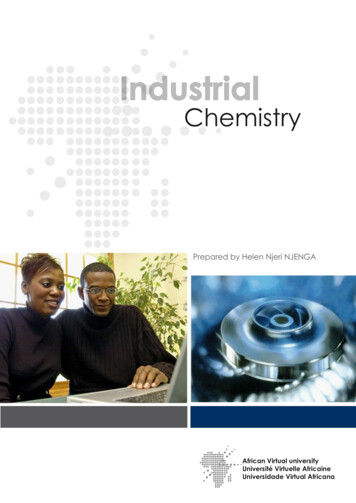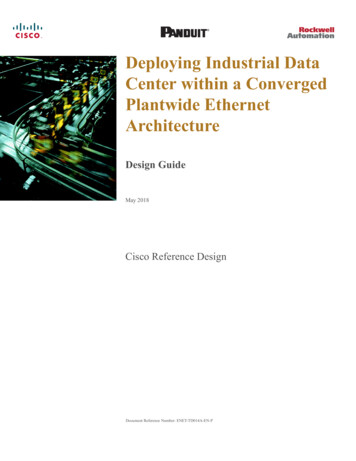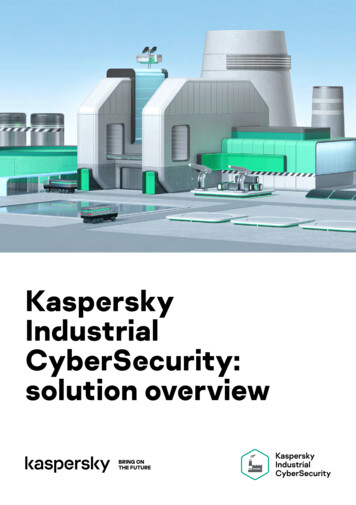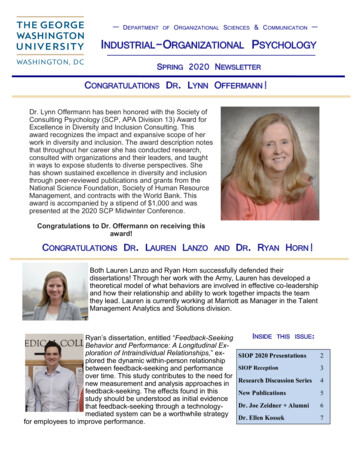
Transcription
— DEPARTMENTOFORGANIZATIONAL SCIENCES & COMMUNICATION —INDUSTRIAL-ORGANIZATIONAL PSYCHOLOGYSPRING 2020 NEWSLETTERCONGRATULATIONS DR. LYNN OFFERMANN!Dr. Lynn Offermann has been honored with the Society ofConsulting Psychology (SCP, APA Division 13) Award forExcellence in Diversity and Inclusion Consulting. Thisaward recognizes the impact and expansive scope of herwork in diversity and inclusion. The award description notesthat throughout her career she has conducted research,consulted with organizations and their leaders, and taughtin ways to expose students to diverse perspectives. Shehas shown sustained excellence in diversity and inclusionthrough peer-reviewed publications and grants from theNational Science Foundation, Society of Human ResourceManagement, and contracts with the World Bank. Thisaward is accompanied by a stipend of 1,000 and waspresented at the 2020 SCP Midwinter Conference.Congratulations to Dr. Offermann on receiving thisaward!CONGRATULATIONS DR. LAUREN LANZO AND DR. RYAN HORN!Both Lauren Lanzo and Ryan Horn successfully defended theirdissertations! Through her work with the Army, Lauren has developed atheoretical model of what behaviors are involved in effective co-leadershipand how their relationship and ability to work together impacts the teamthey lead. Lauren is currently working at Marriott as Manager in the TalentManagement Analytics and Solutions division.Ryan’s dissertation, entitled “Feedback-SeekingBehavior and Performance: A Longitudinal Exploration of Intraindividual Relationships,” explored the dynamic within-person relationshipbetween feedback-seeking and performanceover time. This study contributes to the need fornew measurement and analysis approaches infeedback-seeking. The effects found in thisstudy should be understood as initial evidencethat feedback-seeking through a technologymediated system can be a worthwhile strategyfor employees to improve performance.INSIDETHIS ISSUE:SIOP 2020 Presentations2SIOP Reception3Research Discussion Series4New Publications5Dr. Joe Zeidner Alumni6Dr. Ellen Kossek7
— DEPARTMENTOFORGANIZATIONAL SCIENCES & COMMUNICATION —As you probably know, the SIOP conference in Austinwas cancelled, but we wanted to share all the GW workthat would have been presented — and may yet bepresented in some kind of online format that SIOP iscurrently considering. The work below is availablethrough the presenters listed.Arnold, G., Wright, C., & DuVernet, A. (2020, April). Integrating Other I-O disciplines with training research:A roundtable discussion. Roundtable discussion at the Annual Society for Industrial and Organizational Psychology Conference. Austin, TX.Bal, P. M., Born, D. H., Caligiuri, P. Foley, K. O., Gonzalez-Morales, M. G., Swigart, K., Weiner, S. P.(2020, April). Political ideas in global workplaces: Role of I-O in politically-charged environments. Panel atthe Annual Society for Industrial and Organizational Psychology Conference, Austin, TX.Behrend, T. S., Howard, M. C., Lee, L. M., Marin, S., Montefiori, L., Pitcher, B. D. (No Authorship Order)(2020, April). Virtual reality and assessment: Future directions for research and practice. Alternative Session at the 35th Annual Society for Industrial and Organizational Psychology Conference, Austin, TX.Costanza D. P. (2020, April). IGNITE session: Hot topics for the future of work: The future (age diverse)workforce. Presentation at the 35th annual meeting of the Society for Industrial and Organizational Psychology, Austin, TX.Foley, K. O. & Ness, A. M. (2020, April). Assessing within-person variability: Tools for your toolbox. Symposium at the Annual Society for Industrial and Organizational Psychology Conference, Austin, TX.Foley, K. O., Hughes, E. R., & Badger-Darrow, J. M. (2020, April). The impact of ethical leadership depends on climate strength. Poster to be presented at the 35th Annual Meeting of the Society for Industrialand Organizational Psychology, Austin, TX.Gonzalez, M. F., Liu, W., Shirase, L., Tomczak, D. L., Lobbe, C. E., Justenhoven, R., Brandt, O., Tschöpe,N., Martin, N. R., & Preuss, A. (2020, April). AI as an ally: Improving reactions to artificial intelligence. In M.Langer & J. Basch (Chairs), Interview technology and AI: Effects on applicants, evaluators, and adverse impact. Symposium to be presented at the 35th annual meeting of the Society for Industrial and Organizational Psychology, Austin, TX.Ravid D. M. & Behrend, T. S. (2020, April). Break time task reminders, psychological detachment, and performance recovery. Poster to be presented at the 35th Annual Meeting of the Society for Industrial and Organizational Psychology, Austin, TX.Tomczak, D. L., Mancarela, P. J., Zarsky, S. & Behrend, T. S. (2020, April). An instrument for measuringelectronic performance monitoring practices. Poster to be presented at the 35th annual meeting of the Society for Industrial and Organizational Psychology, Austin, TX.Harvey, T. J., Offermann, L. R., & Salvas, A. L. (2020, April). Why did they stay? The impact of racebased discrimination on work-related outcomes. Poster to be presented at the 35th annual meeting of theSociety for Industrial and Organizational Psychology, Austin, TX.Salvi, S., Perez, J., Riccardi, C., Rudolph, C., & Costanza, D. (2020, April). The narcissism epidemic? Acautionary tale of "Generational" differences. Poster to be presented at the 35th annual meeting of the Society for Industrial and Organizational Psychology, Austin, TX.White, J. C. & Behrend, T. S. (2020, April). Can you hear me now? The influence of technology disruptionsin virtual interviews. In Langer M. and Bach, J. (Co-Chairs) Interview technology and AI: Effects on applicants, evaluators, and adverse impact. Symposium to be presented at the 35th Annual Conference of theSociety of Industrial and Organizational Psychology, Austin, TX.Page 2
— INDUSTRIAL-ORGANIZATIONALPSYCHOLOGY PROGRAM—THE GEORGE WASHINGTON SIOP 2020 RECEPTION—POSTPONED UNTIL APRIL 2021SEE YOU IN NEW ORLEANS!Thank you to our generous alumni donors for contributing to the SIOP Reception Fund! Weare so grateful for your support!Thank you for the pledges we have already received! If you have not made a pledge yet and wouldlike to donate for our reception, there is still time to do so. All funds received will be applied tosupporting next year’s reception in New Orleans.In addition to making your gift, please complete the pledge form for our tracking purposes.Make your gift here: https://giving.gwu.edu/Be sure to specify the “IO Psychology PhD Programs” as the designated recipient.Pledge form: https://goo.gl/forms/l8r9CPA1mumNxd8G3A MESSAGE ABOUT COVID-19—IMPORTANT INFORMATIONDear Alumni and Friends of the IO program,As you can see from these pages, the COVID-19 virus has forced many changes on all of us, bothpersonally and professionally. Our flagship SIOP conference has been cancelled, though SIOP ispursuing other ways to present the work represented at left. Know that all funds donated towardsthe planned get-together in Austin will be used toward a similar event next year at SIOP New Orleans (April 15-17, 2021).Due to the virus, GW — as with most universities—has cancelled all face-to-face activities for theremainder of this academic term. All GW classes started fully online as of March 23, So far, ouronline systems have been working well. Fortunately, your IO faculty are pretty tech-savvy, and ourclasses have been proceeding smoothly. Our teaching and research goes forward nonetheless, though obviously in-person studies have been postponed.This can still be a time of growth for all of us, as we learn new strategies and bolster our adaptation skills . Nonetheless, we look forward to returning to a time when we can connect more directlywith all of you and resume in-person events. Meantime, for however long it takes, we hope thatyou are all safe and well, and taking appropriate precautions.Our best to all of you,The IO faculty and studentsPage 3
— DEPARTMENTOFORGANIZATIONAL SCIENCES & COMMUNICATION —RESEARCH DISCUSSION SERIESOn February 7th, Daniel Ravid and Ahleah Miles both presented their second year projects onbreaks and workplace incivility.Dan’s research addressed the degree to which task-related thoughts during a short break from ademanding vigilance task mediated the relationship between differing break contexts (e.g. a breakwith task reminders, a break with a relaxing video) and performance following the break. Resultsshowed that break context was associated with differences in task-related thoughts during thebreak. Further, a direct effect was observed between task condition and performance recoverysuch that individuals who experienced task reminders during the break tended to recover lessthan individuals in other conditions. However, no mediating effect of task-related thoughts was observed, and the degree to which an individual engaged in task-related thoughts was not related totheir performance recovery following the break.Ahleah’s research looked into workplace incivility, a subtle form of workplace aggression that isambiguous but violates norms of mutual respect, in the context of undergraduate student leadersto determine the patterns of incivility and responses to it. Results suggested that both personalityand organizational climate play a role in experienced and perpetrated incivility. Future researchshould explore the reframing of perceived organizational norms for interpersonal interactions aswell as repeated instances of incivility interactions over time.On February 28th, Dr. Costanza and Dr. Offermann discussed the art of grant-getting, grant applications, and the evaluation process of grant-winning. Dr. Offermann presented information specifically on the NSF and NIH process, while Dr. Costanza spoke about general ways to approachthe grant application and writing process.Dr. Jennifer Logg, Assistant Professor of Management atGeorgetown University, was scheduled to present her research onMarch 27th at 11am. The title of her discussion is “Algorithm appreciation: People prefer algorithmic to human judgment”. Dr. Logg’s primary line of research focuses on how individuals can assess themselvesand the world more accurately. Even though computational algorithmsoften outperform human judgment, received wisdom suggests thatpeople may be skeptical of relying on them (Dawes, 1979). Counter tothis notion, results from six experiments show that lay people adheremore to advice when they think it comes from an algorithm than from aperson. She calls this effect “algorithm appreciation.” This paper fitsinto a broader program of work that examines how people expect algorithmic and human judgment to differ (a theoretical framework shecalls Theory of Machine, a twist on the classic “theory of mind”). Wehope to reschedule this presentation for the Fall semester.Our own Dr. Yisheng Peng was scheduled to present in April on hiscurrent research. Dr. Peng’s research revolves around age and work outcomes such as workplace deviance and proactive work behaviors. He looks at these relationships and underlyingmechanisms through both social and emotional aging perspectives. We will catch up with him inthe Fall semester as well. Stay tuned for dates for these and other presentations when we’reback to regular campus life.Page 4
— INDUSTRIAL-ORGANIZATIONALPSYCHOLOGY PROGRAM—RECENT PUBLICATIONSClark, O., Peng, Y., & Jex, S. (in press). Exclusion in the workplace: A multi-level investigation. International Journal of Workplace Health Management.Costanza, D. P., Finkelstein, L. M., Imose, R. A., & Ravid, D. M. (2020). Inappropriate inferences fromgenerational research. The Cambridge Handbook of the Changing Nature of Work (B. Hoffman, M.Shoss, & L. Wegman, Eds.). Cambridge: Cambridge University Press.Offermann, L. & Foley, K. (2020). Is there a female leadership advantage? In Oxford Research Encyclopedia of Business and Management. Oxford University Press.Oswald, F. L., Putka, D., Behrend, T. S., & Sinar, E. (2020). Big data in human resource management. Annual Review of Organizational Psychology and Organizational Behavior, 5(1), 18.1-18.29.Peng, Y., Xu, X., & Matthews, R. A (in press). Older and less deviant reactions to abusive supervision? Work, Aging, and Retirement.Peng, Y., Jex, S., Zhang, W., *Ma, J., & Matthews, R. A. (2020). Eldercare demands and time theft: Integrating family-to-work conflict and spillover–crossover perspectives. Journal of Business and Psychology, 35(1), 45-58.Peng, Y., Xu, X., Jex, S., & Chen, Y. (2019). The roles of job-related psychosocial factors and work meaningfulness in promoting nurses’ bridge employment intentions. Journal of Career Development. Advance online publication.Ravid, D. M., Tomczak, D. L., White, J. C., & Behrend, T. S. (2019). EPM 20/20: A review, framework,and research agenda for electronic performance monitoring. Journal of Management.Rudolph, C. W., Costanza, D. P., Wright, C., & Zacher, H. (2019). Cross-temporal meta-analysis: A conceptual and empirical critique. Journal of Business and Psychology.Wang, Z., Jex, S. M., Peng, Y., Liu, L., & Wang, S. (2019). Emotion regulation in supervisory interactionsand marital well-being: A spillover–crossover perspective. Journal of Occupational Health Psychology, 24, 467–481.White, J. C., Ravid, D. M., & Behrend, T. S. (2019). Moderating effects of person and job characteristicson digital monitoring outcomes. Current Opinion in Psychology.White, J. C., Behrend, T. S., & Siderits, I. O. (2020). Changes in workplace technology. In B. Hoffman, M.Shoss, & L. Wegman (Eds.), Cambridge Handbook of the Changing Nature of Work. CambridgeUniversity Press.Xu, X., Peng, Y., Zhao, P., Hayes, R., & Jimenez, W. P. (2019). Fighting for time: Spillover and crossovereffects of long work hours among dual-earner couples. Stress and Health. 35, 491-502.Zhao, P., Xu, X., Peng, Y., & Miner, K. (in press). The target of incivility cannot be an island: Top-downgroup influence. Journal of Personnel Psychology.Page 5
— DEPARTMENTOFORGANIZATIONAL SCIENCES & COMMUNICATION —DR. JOE ZEIDNERThe IO Psychology program is saddened by the passing of Dr.Joseph Zeidner last year at the age of 91. Dr. Zeidner was asignificant contributor to the Organizational Sciences andCommunication department as the founder of what is now theMasters of Arts in Organizational Sciences program. From1982 to 1999, Dr. Zeidner was a professor of administrativesciences and psychology at the George Washington University. Before this role, he worked at the Army Research Institutefor the Behavioral and Social Sciences from 1952 to 1982.During this time, he served as the Institute's technical directorand chief psychologist.In honor of the life and contributions of Dr. Zeidner, the Organizational Sciences program announced this year a new awardfor graduating seniors bearing his name. The Zeidner Prize willserve to recognize academic excellence among OrganizationalSciences majors. The prize includes a 250 award and thewinner will be recognized in the university commencement program and on a plaque in the Department’s offices.ALUMNI UPDATESGarett Howardson is currently a Research Psychologist atthe U.S. Army Research Institute for the Behavioral and Social Sciences where he manages the Learning in Formal andInformal Environments portfolio. His work centers on integrating learning conceptualizations that span diverse temporal,social, and spatial scales. One example research question tothis effect might be: "What are the similarities between how aneuron learns and how an organization learns?" To pursuesuch questions, he combines his background in industrialorganizational psychology, quantitative research methods,and computer science.Allison Yost currently works for BetterUp, which is an appbased tool that employees of all levels can use for coachingand development. BetterUp pairs employees with trainedcoaches in order to work together to increase leadership behaviors and aid in finding meaning and satisfaction in theirwork. Specifically, Allison is the Regional Vice President ofSolutions Consulting at BetterUp.Page 6
— INDUSTRIAL-ORGANIZATIONALPSYCHOLOGY PROGRAM—GW-BRIDGE: DR. ELLEN ERNST KOSSEKDr. Ellen Ernst Kossek gave a talk on women’s career equalityand work-life inclusion from and organizational scienceperspective on March 5th. This event was sponsored by our ownGW-BRIDGE University Seminars Program. “BRIDGE” standsfor Building Research Interdisciplinarily to Develop GenderEquity. Dr. Kossek is a Professor at the Purdue UniversityKrannert School of Management, and is also the Director ofResearch at the Butler Center for Leadership Excellence.Dr. Kossek discussed gender, work-family conflict, and careerequality, as her work seeks to bridge the gap between thecareers literature and work-family issues. Specifically, Dr. Kossekseeks to integrate three perspectives on women’s career equality:work-family conflict, gender bias, and career preference. She has found that women’s careerequality is an issue in many fields beyond the often discussed STEM fields, as many females findthere are issues with careers stalling or leaky pipelines to top positions.Dr. Kossek has also developed a training for supervisors on Family Supportive Supervisor Behaviors(FSSBs) that has been shown to have effects on increased employee job satisfaction, lowerturnover, and improved physical and mental health.She has recently done an NSF workshop in which she investigated career-life balance for female full-time business school faculty. Dr. Kossek identified the importance of career-life balance beyondprofessional well-being to its physical and mental health impacts, as well as its importance societallyand economically. In her talk, she identified ways in which both individuals and organizations canachieve positive work and non-work outcomes through an organizational climate for genderinclusion. Most recently she has done work on technology and boundary management, providingstrategies to establish work-life boundaries as technology contributes to the blurring of boundaries.THE SCIENTIA FUTURE OF WORK CONFERENCEThe Scientia Future of Work conference is a small interdisciplinary conference held at Rice University in Houston, TX that brought together thought leaders from the fields of computer science, economics, industrial/organizational psychology and human factors to develop a research agendaaround four main topics: automation, workforce development, leadership and policy.The conference took place February 13th-14th. Tara Behrend delivered a talk centered on the importance of vocational interests in skill development for the workforce of the future. PeterMancarella and Dave Tomczak presented a poster on electronic performance monitoring (EPM)devices and monitoring acceptance, arguing that monitoring policy should be developed such thatit accommodates the contextual factors associated with monitoring acceptance.Page 7
Every donor is important to our program’s mission!To make a gift to the I/O Psychology Program, you can do so by clicking here. You can also makeyour gifts over the phone by calling the GW Division of Development and Alumni Relations at 1-800789-2611. Please be sure to designate your gift to the “I-O Psychology PhD program”.Questions? Email: jbracey@gwu.eduIf your organization would like to become a sponsor, please contact Tara Behrend atbehrend@gwu.edu2019-2020 Newsletter EditorsSarah Salvi, TaniyiaHarvey, and Bradley PitcherThe George Washington UniversityDepartment of Organizational Sciences & Communication600 21st streetWashington DC, 20052THE GEORGE WASHINGTON UNIVERSITY
sium at the Annual Society for Industrial and Organizational Psychology Conference, Austin, TX. Foley, K. O., Hughes, E. R., & Badger-Darrow, J. M. (2020, April). The impact of ethical leadership de-pends on climate strength. Poster to be presented at the 35th Annual Meeting of the Society for Industrial an
